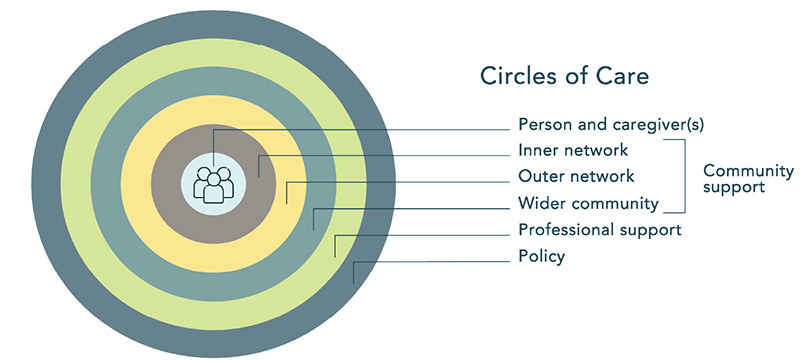Build community support
Compassionate Communities is a movement dedicated to building communities where people have the knowledge and skills to provide practical and emotional support for people who are sick, dying, caregiving and grieving.
Compassionate Communities complement health services and expand the community’s capacity to care for people facing serious illness. They recognize illness, dying and grief as part of life and encourage everyone to play a part in caring for those going through these experiences.
Compassionate Communities build "circles of care" around people who are sick and dying, and those closest to them. These "circles" can include:
- friends and neighbours
- workplaces and schools
- faith and cultural communities
- social clubs
- support groups
- community organizations

Building Compassionate Communities
PalliLearn
PalliLearn courses are one way to gain valuable knowledge and skills to support the people around you. Consider attending courses or hosting them in your community.
Connect with your local hospice or palliative care society
Hospice and palliative care societies put the philosophy of Compassionate Communities into action in communities across Alberta.
These non-profit organizations offer a range of programs and services to support people living with serious illnesses, including public education, volunteer services, grief support and, in some cases, residential hospice care.
To find out more, read our report, Raising Public Awareness of Palliative Care: A 2021 survey of Alberta Hospice and Palliative Care Societies.
Interested in volunteering with your local palliative care or hospice society or know someone who might benefit from the programs they offer?
Hospice volunteers create meaningful moments
The journey toward the end of life can be an emotional one. Hospice volunteers help provide support and comfort to residents and their family members.
ReadApril 11, 2019

More resources
For individuals
Caring Bridge: A website to help people living with an illness communicate with, ask for and receive help from their social network.
COMPASS for Caregivers: A facilitator-led four-session program from Caregivers Alberta to help caregivers balance their own well-being with the challenges of caregiving.
Home Caregiver Support Program: An online, self-directed course from St. John Ambulance and the Order of St. Lazarus to train caregivers to care for the physical, social, emotional and spiritual needs of those with serious illnesses.
LEAP Carers: An online, self-directed course from Pallium Canada that provides information and training to people caring for family or friends with a serious illness. Topics include navigating the health care system, advance care planning, how to provide personal care, medication management, communication and self-care strategies.
Lotsa Helping Hands: An online calendar and communication tool to facilitate community support for individuals and caregivers that need a helping hand in the form of meal delivery, transportation, childcare and other types of help.
My Collaborative Care Plan: A workbook from La Trobe University designed to help those who are sick or caregiving identify practical needs and create a plan to meet them – with the help of their social network and community services.
MyGrief: A series of self-directed modules from Canadian Virtual Hospice that helps people understand and cope with grief. Optional modules address different types of loss.
My Tools 4 Care and My Tools 4 Care – In Care: Toolkits created for caregivers of people with dementia who are living in the community or in a care facility, to better understand what to expect and how best to support the person they care for.
Preparing for the Journey: Caring for Indigenous People Who Are Seriously Ill: A practical guide created at Lakehead University on caring for Indigenous community members with serious illnesses, from engaging in health care planning before a serious illness occurs to caring for someone in the final weeks or days of life.
For community groups
A Resource Guide for Community Development of Palliative and End-of-Life Care within Alberta: An Alberta Health Services resource that outlines how to start a palliative care society in your community, including information about training, fundraising and logistics.
Compassionate Communities Toolkit: A suite of resources developed by the BC Centre for Palliative Care to help communities assess their readiness and commitment to build Compassionate Communities.
Compassionate Community toolkits: Resources from Pallium Canada to help community groups launch Compassionate Community initiatives.
Death Literacy Index: A survey developed by researchers at Western Sydney University to help community groups measure their knowledge and ability to support each other towards the end of life.
Dementia Friendly Communities: A resource aimed at fostering dementia-friendly communities in Alberta, with a six-step plan on how to do so. It provides valuable information on dementia and what dementia-friendly communities look like and features resources such as a template slide deck, an e-learning module and a library speaker series.
Developing Palliative Care Programs in First Nations Communities and Supporting the Development of Palliative Care Programs in First Nations Communities: A set of resources developed by researchers at Lakehead University. Includes a workbook for use by First Nations communities and a guide for outside partners such as health care providers and policymakers to support First Nations in building community capacity to provide palliative care.
Nav-CARE: A program for training volunteers to support people with declining health to live well and independently for as long as possible. Created by Dr. Wendy Duggleby at the University of Alberta and Dr. Barbara Pesut at the University of British Columbia and run in collaboration with community-based organizations.
For schools
Grief in my Backpack: A resource developed by Hospice Calgary that equips teachers and community leaders to support grieving students. Modules focus on understanding grief, supporting students, creating compassionate classrooms and developing protocols for responding to a death in the school community.
Kids Grief: A free online resource developed by Canadian Virtual Hospice to help educators and parents support children when someone in their life is dying or has died.
Youth Grief: A resource developed by Canadian Virtual Hospice with and for grieving youth to help young people navigate the many aspects of grief, including tips for handling specific situations. Includes extensive video content and an art gallery.
For workplaces
Compassionate Community Workplace Toolkit: A set of practical resources developed by Pallium Canada to help employers, managers and employees increase awareness and reduce stigma surrounding serious illness, caregiving and grief in the workplace.
Dementia in the Workplace: A set of resources from the Alzheimer Society of Alberta & Northwest Territories to help Alberta employers and employees learn about the impacts of dementia in the workplace and how to navigate this knowledgeably and compassionately.
Grieving in the Workplace: A source of information from the Government of Alberta on how grief may have an impact in the workplace, what supports may be available to employees and how to support a grieving coworker.
Quick Start Implementation Guide: Carer-Friendly Workplace Standard: An easy-to-read starter guide developed by researchers at McMaster University to help managers and HR professionals better understand the demands on employees who are caregivers and provide practical tips on how to better support them in the workplace.
Support Working Caregivers: Resources, training and support from Caregivers Alberta to help employers and managers support caregiver employees in the workplace.